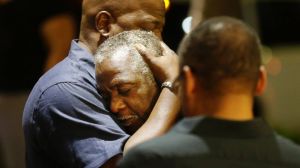
By Anna Floerke Scheid
It is repulsive to me to admit it, but Dylann Roof and I have something in common. The self-proclaimed “Last Rhodesian” and I have both been inspired by the history of Southern Africa. The patches Roof wore in his now ubiquitous Facebook profile picture (show that he had a bit of a fascination with South African apartheid.
Anyone who knows me well knows that I, too, have spent a lot of time studying South Africa, apartheid, and its aftermath. As Roof explored the history of South Africa and “Rhodesia” (now Zimbabwe) he found allies in his impulses toward White Supremacy and violence. In my explorations, I, by the grace of God, found spiritual inspiration in my quest to understand how to forgive. The list of people I look up to includes famous forgivers like Archbishop Desmond Tutu, and Nelson Mandela. And less well known forgivers like Ginny-Pheladi Fourie, whose daughter, Lyndi, was killed in Heidelberg Tavern Massacre in Cape Town in 1993. Since the massacre at Emmanuel A.M.E. Church I have at least three new spiritual role models to help me understand forgiveness.
First, Bethane Middleton-Brown, sister of the slain DePayne Middleton-Doctor who told Roof, “I’m a work in progress and I acknowledge that I’m very angry… We have no room for hate. We have to forgive. I pray God on your soul.”
Then, Felicia Sanders, mom of Tywanza Sanders, “Tywanza was my hero…but may God have mercy on you.”
And also Nadine Collier, daughter of Ethel Lance who, through tears, told Roof, “I forgive you. You took something really precious away from me. I will never talk to her ever again. I will never be able to hold her again. But I forgive you and have mercy on your soul. It hurts me, it hurts a lot of people but God forgive you and I forgive you.”
In the same way that Christians sometimes oversimplify things like sin (“Whoops, I probably shouldn’t have done that…”), eschatology (“I want to go to heaven when I die! Resurrection of the body? What are you talking about?”), I think we also often oversimplify forgiveness: “Jesus told us to forgive! Why are you clinging to the past? Why can’t you just forgive your mom, dad, brother, sister, step-parent, etc.? Get over it! Forgive and forget!”
Somewhere deep inside, where we are hurting the most, I think we Christians know that forgiveness isn’t that simple. It’s really quite complex and even mysterious. The theologian Robert Schreiter, who has spent much of his life studying how people come to forgive in the aftermath of serious violations of human rights, calls forgiveness a spirituality. In other words, forgiveness isn’t some kind of conflict management tool. It is a grace that wells up in the soul of the person or community that has been victimized. That means that no human being can “require” me to forgive, and if I am unable to forgive, no human being should stigmatize me or try to make me feel ashamed of that incapacity, because forgiveness is God’s work in me, a free gift of grace.

Understanding forgiveness as a spirituality resonates well with what I have learned from South Africa. It also echoes in the statements made by family members of the Charleston slain. At least four “truths” about forgiveness resound.
First, forgiveness, as a spirituality, isn’t a once-and-for-all-time kind of moment. A spirituality is something I have to engage regularly. I have to practice it. A spirituality of forgiveness means relating anew each day to God’s healing grace working on the abuse or violation that was done to me. It means struggling to remain open to this grace of forgiveness even in the midst of my hurt and anger. As Middleton-Brown said, “I’m a work in progress…and I acknowledge that I’m very angry.” Forgiveness doesn’t mean not feeling hurt. It doesn’t mean not feeling angry. What it does seem to involve is a recommitment every day to let go of impulses toward rage and vengeance, and instead to struggle to embrace God’s love and peace.
Second, the families have it right. Their forgiveness is not so much about bestowing a gift upon Dylann Roof. It is less important that forgiveness might be beneficial to a murderer, torturer, or abusive parent or spouse. The benefits of forgiveness for the perpetrator are secondary to the benefits for the victim. Forgiveness is about the person who is abused, or tortured, it is about the families of the murdered dead. In other words, the subject of forgiveness is not primarily the perpetrator, but the victim; not violator, but violated. The reason that I want to forgive is, at least in part, to free myself from the potentially debilitating rage and hatred that can take over my life and just destroy it. I forgive the one who hurt me for myself, for peace in my own soul. Again, Middleton-Brown speaks wisely: “We have no room for hate.” I am not even convinced that forgiveness has to be communicated to the abuser (otherwise it might feel impossible to forgive the dead). Though, if I desire not just forgiveness but reconciliation, then it probably does need to be communicated.
Which brings me to a third point. Forgiveness isn’t reconciliation. They are related, but they aren’t interchangeable concepts, or actions. The grace God bestows on us to enable us to forgive is different from the grace of reconciliation. In forgiveness I release myself from the burdens of hatred. I embrace the grace of God because I do not want the ways that I have been abused, degraded, or violated to control me. Reconciliation is different. The grace of reconciliation enables me to establish a relationship with the person who abused, degraded, or violated me. My embrace of a spirituality of forgiveness does not necessarily mean that I want to reconcile with the person, or people, who harmed me. The families of the Charleston slain have embraced a spirituality of forgiveness, but we shouldn’t expect them to visit Roof in prison, to want to get to know him, or to comfort him. Distinguishing between forgiveness and reconciliation is important. It isn’t hard to imagine situations where a person might want to forgive a perpetrator without wanting to have a relationship with him. It is okay to avoid situations where reconciliation – attempting to be in regular relationship with someone – risks victimization. For example, a formerly abused spouse may want to forgive her husband, but that doesn’t mean she wants to reconcile if that involves putting herself back in a position to be harmed. She can forgive, without desiring reconciliation.
Finally, where do apologies fit in? The families of the Charleston slain illustrate in a way that is painfully beautiful that their forgiveness is not contingent upon Roof’s remorse. They have expressed forgiveness despite his lack of apology. That my forgiveness is not dependent on the remorse or apology of a person who hurts me is a profound and empowering truth. Don’t get me wrong. Apologies are important – they are critical for a perpetrator or abuser who wishes to heal herself, and they are also key to promoting reconciliation. But if forgiveness is indeed a spirituality, if it is an experience of God’s grace welling up in my soul to free me from hatred and form me in love, then we cannot suggest that your apology means I must forgive. Forgiveness doesn’t work that way. It can’t be required as a rote response to someone’s apology. It has to be prayed into being – and in my experience, like all moments of grace and salvation, there is much fear and trembling involved.
It is downright nauseating to think that Dylann Roof and I have something in common. Southern Africa taught both of us. It taught him hate. It taught me forgiveness. And now his heartbroken victims – like the victims of apartheid – respond to his hatred with love. Their forgiveness seems supernatural, because it is. Formed by faith in the one who begged God to forgive his torturers “for they know not what they do,” Bethane Middleton-Brown, Felicia Sanders, and Nadine Collier know that hatred is all-consuming and forgiveness is liberation from rage and despair. They embrace God’s grace for love and freedom, and they give us a model of the spirituality of forgiveness.
Anna Floerke Scheid, Ph.D. is an Assistant Professor of Theology at Duquesne University where she teaches and researches in the area of Christian social ethics with attention to the just war tradition, peacebuilding, and post-conflict forgiveness and reconciliation. She is the author of Just Revolution: A Christian Ethic of Political Resistance and Social Transformation (Lexington Books, Rowman and Littlefield Press, 2015). Her work appears in the Journal of the Society of Christian Ethics, Horizons, and Teaching Theology and Religion.

You must be logged in to post a comment.